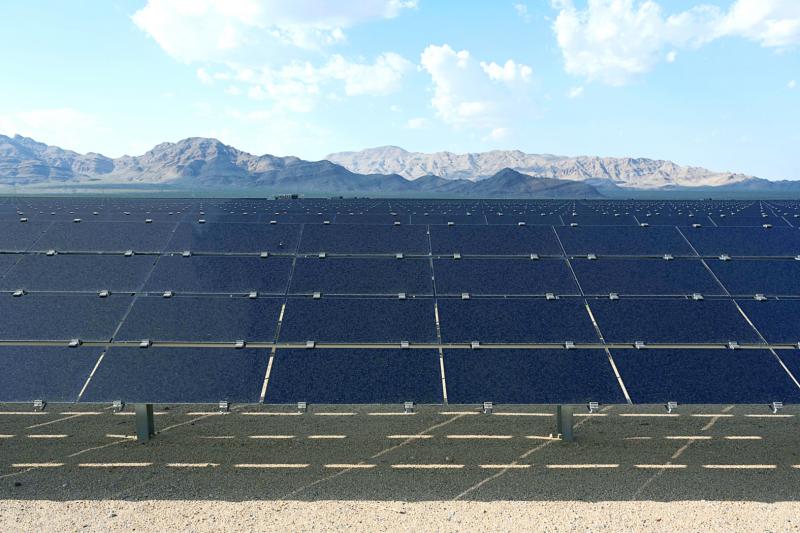A WTO dispute panel has rejected all four of China’s claims against the US relating to safeguard measures that the administration of former US president Donald Trump imposed on solar panels imported from Chinese manufacturers.
China did not establish that Washington’s safeguards against imports of certain crystalline silicon photovoltaic cells are inconsistent with the WTO’s rules on the measures, the Geneva-based body said in a report published on Thursday.
Trump in January 2018 announced four years of import caps and tariffs on panels after a certain amount is brought in — so-called tariff-rate quotas. That was in response to a trade suit filed in April 2017 by a bankrupt US solar manufacturer that argued it had been harmed by a wave of cheap imports, mostly from Asia. The US International Trade Commission agreed in October that year, paving the way for Trump’s decision.

Photo: Reuters
Bloomberg data show that Chinese suppliers flooded the US solar market with panels at the end of 2017 as customers sought to avoid paying a 30 percent tariff.
US Trade Representative Katherine Tai welcomed the ruling.
“We must make historic infrastructure investments that unlock the full potential of solar power and create good-paying jobs in cutting-edge fields that will help address the climate crisis,” she said in an e-mailed statement.
The WTO’s dispute settlement body set up a panel to hear China’s case in August 2019, with Beijing alleging that Washington acted inconsistently with a number of articles in the organization’s general agreement on tariffs and trade.
Among China’s allegations that the WTO rejected was that the US failed to establish the required causal link between the increased imports and the serious injury found to exist.
The dispute settlement body would adopt the panel’s report within 60 days unless either the US or China notifies it of a decision to appeal.

Nvidia Corp chief executive officer Jensen Huang (黃仁勳) on Monday introduced the company’s latest supercomputer platform, featuring six new chips made by Taiwan Semiconductor Manufacturing Co (TSMC, 台積電), saying that it is now “in full production.” “If Vera Rubin is going to be in time for this year, it must be in production by now, and so, today I can tell you that Vera Rubin is in full production,” Huang said during his keynote speech at CES in Las Vegas. The rollout of six concurrent chips for Vera Rubin — the company’s next-generation artificial intelligence (AI) computing platform — marks a strategic

Enhanced tax credits that have helped reduce the cost of health insurance for the vast majority of US Affordable Care Act enrollees expired on Jan.1, cementing higher health costs for millions of Americans at the start of the new year. Democrats forced a 43-day US government shutdown over the issue. Moderate Republicans called for a solution to save their political aspirations this year. US President Donald Trump floated a way out, only to back off after conservative backlash. In the end, no one’s efforts were enough to save the subsidies before their expiration date. A US House of Representatives vote

REVENUE PERFORMANCE: Cloud and network products, and electronic components saw strong increases, while smart consumer electronics and computing products fell Hon Hai Precision Industry Co (鴻海精密) yesterday posted 26.51 percent quarterly growth in revenue for last quarter to NT$2.6 trillion (US$82.44 billion), the strongest on record for the period and above expectations, but the company forecast a slight revenue dip this quarter due to seasonal factors. On an annual basis, revenue last quarter grew 22.07 percent, the company said. Analysts on average estimated about NT$2.4 trillion increase. Hon Hai, which assembles servers for Nvidia Corp and iPhones for Apple Inc, is expanding its capacity in the US, adding artificial intelligence (AI) server production in Wisconsin and Texas, where it operates established campuses. This

US President Donald Trump on Friday blocked US photonics firm HieFo Corp’s US$3 million acquisition of assets in New Jersey-based aerospace and defense specialist Emcore Corp, citing national security and China-related concerns. In an order released by the White House, Trump said HieFo was “controlled by a citizen of the People’s Republic of China” and that its 2024 acquisition of Emcore’s businesses led the US president to believe that it might “take action that threatens to impair the national security of the United States.” The order did not name the person or detail Trump’s concerns. “The Transaction is hereby prohibited,”